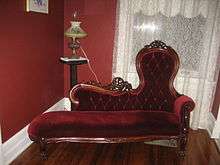Fainting couch
A fainting couch is a term said to have been used for a couch with a back that is traditionally raised at one end. The back may be situated completely at one side of the couch, or may wrap around and extend the entire length of the piece much like a traditional couch. However, so-called "fainting couches" are easily differentiated from more traditional couches, having one end of the back raised.[1]

Red upholstered fainting couch.
The style of couch referred to popularly as "fainting couches" were popular in the 19th century as a revival of ancient furniture styles.[1]
Some people today believe that houses would take this to the level of having separate fainting rooms, where these couches would be the featured furniture.
Popular speculation about the need for fainting couches
- The term "fainting couch" is not documented as being in use until the 20th century. There is nothing to suggest in advertising of the Victorian era that any article of furniture was created specifically for people to use when feeling faint and should only be considered a myth.[2]
- Corsets: One theory for the predominance of fainting couches is that women were actually fainting because their corsets were too tight, restricting blood flow. However, pictures from the 1860s show women horseback riding, playing tennis, and engaging in other vigorous activities in corsets without hindrance.[1]
- Female hysteria: The second most common theory for the predominance of fainting couches is home treatment of female hysteria through manual pelvic massage by home visiting doctors and midwives.[3] As a "disease" that needed constant, recurring (usually weekly) in-home treatment with a procedure that through manual massage could sometimes take hours, creating specialized furniture for maximum comfort during the extended procedure seems likely, as does the later creation of fainting rooms for privacy during the intimate massage procedure.
gollark: Again, it's called rounding.
gollark: Mine was better.
gollark: Rounding. Anyway, did I do the "liking" thing wrong?
gollark: It would probably have been sensible to actually put any effort whatsoever into making a submission which wasn't obviously mine.
gollark: Well, at least I was joint second on guess accuracy.
See also
References
- "New York Times".
- https://www.lancasterhistory.org/debunkingcorsetrymyths/
- Rachel P. Maines (1999). The Technology of Orgasm: "Hysteria", the Vibrator, and Women's Sexual Satisfaction. Baltimore: The Johns Hopkins University Press. ISBN 0-8018-6646-4.
Further reading
- John Gloag, A Short Dictionary of Furniture, rev. ed. 1962. (London: Allen & Unwin).
- Ellis-Christensen, T., & Wallace, O. (2014, July 7). . WiseGeek. Retrieved July 15, 2014, from http://www.wisegeek.com/what-is-a-fainting-couch.htm
External links

This article is issued from Wikipedia. The text is licensed under Creative Commons - Attribution - Sharealike. Additional terms may apply for the media files.